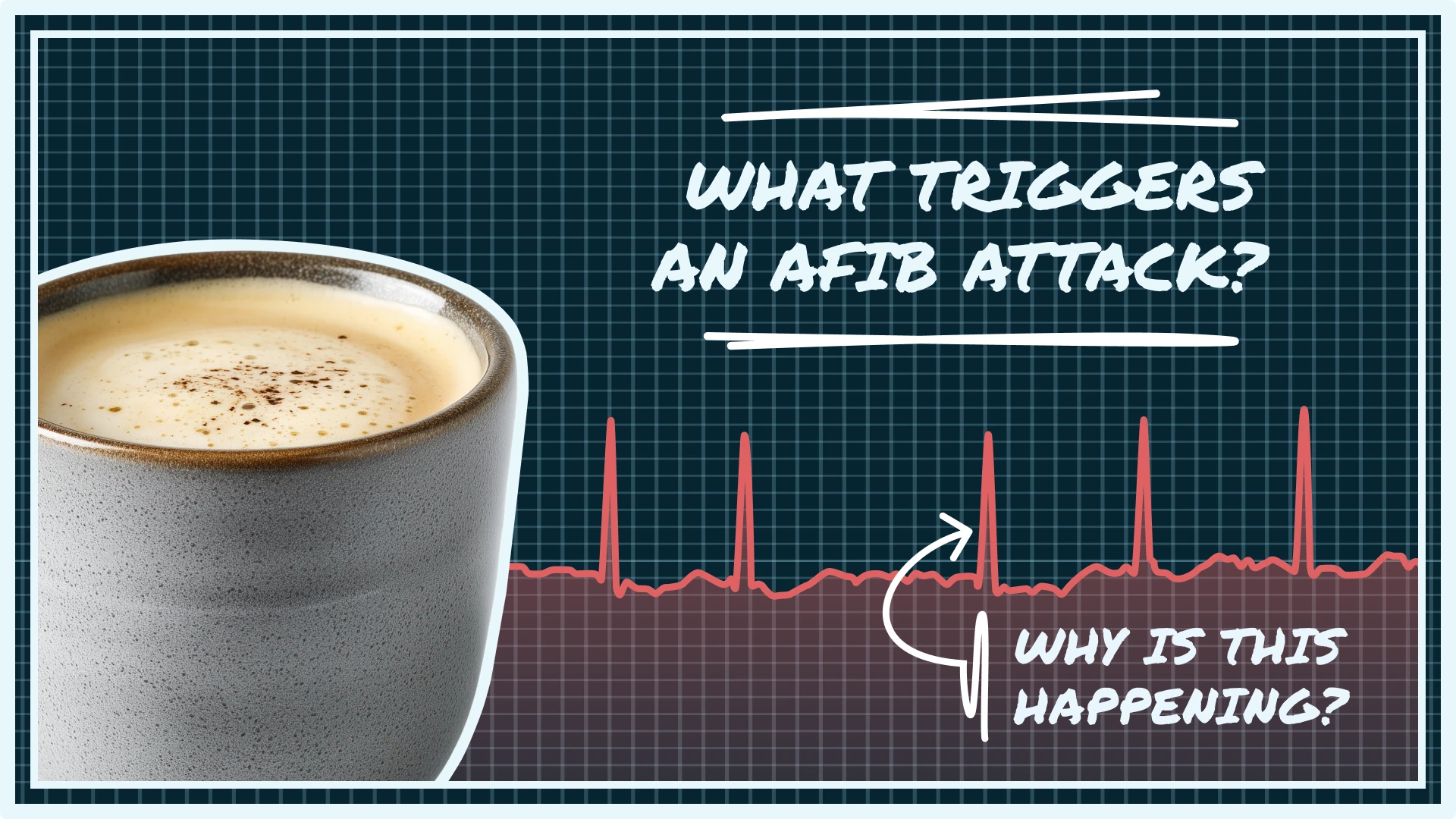Key Takeaways
Hello, Heart Hero. An Atrial Fibrillation (AFib) episode can feel like it comes out of nowhere, but it's often kicked off by something specific in your day-to-day life, your physical health, or even your emotional state. We often hear about the usual suspects, things like alcohol, stress, dehydration, poor sleep, and overexertion, but what triggers your AFib can be deeply personal and unique to you. Figuring out these patterns is the first and most powerful step toward getting a handle on your heart's rhythm.
Your Guide to Understanding AFib Triggers
That sudden flutter, racing, or pounding in your chest can be really unsettling. It's completely normal to feel confused, frustrated, and maybe even a little lost when you can't pinpoint why it’s happening. We get it. Navigating a healthcare system that can feel impersonal and confusing only adds to the stress. You're looking for real answers, and you deserve them.
Think of this guide as a trusted friend here to help you decode what might be setting off an AFib attack. We'll walk through the common (and sometimes surprising) factors that can start an episode, moving beyond generic advice to give you insights you can actually use. Our goal is simple: to arm you with knowledge, help you connect the dots in your own life, and put you back in the driver’s seat of your heart health journey.
What Sets Off an AFib Attack?
Imagine your heart has a perfectly steady, rhythmic drumbeat. An AFib trigger is anything that throws that drummer off, causing the beat to become chaotic and out of sync.
The tricky part is that these triggers aren't the same for everyone. What sets off an episode for one person might have zero effect on another. That’s why becoming a detective of your own health is so important. It’s not about guesswork; it’s about listening to your body.
Because the possibilities are so broad, it helps to organize them into three main buckets:
- Lifestyle Triggers: These are tied to your daily routines and habits. Think about what you eat and drink, how much you move, and if you've had any alcohol.
- Emotional Triggers: Your mind has a powerful connection to your heart. Intense stress, anxiety, or even a sudden shock or burst of excitement can be enough to start an episode.
- Physical Triggers: This covers things that put extra strain on your body. Getting sick, being dehydrated, not sleeping well, or having other underlying health issues can all play a role.
Understanding your personal triggers is like having a roadmap for your heart health. It allows you to navigate daily life with more confidence, knowing which situations might require extra care or moderation. This isn't about avoiding life; it's about living it more wisely and on your own terms.
To help you visualize this, here’s a quick breakdown of the primary categories of AFib triggers.
To make this even clearer, let's break down the most common triggers into a simple table.
Quick Guide to Common AFib Triggers
Here’s a summary of the most frequently reported triggers for atrial fibrillation, categorized so you can easily spot potential patterns in your own life.
This table isn't meant to be a list of things to fear, but rather a tool to help you start connecting the dots. Consider this your first step toward decoding your body's unique signals with confidence.
The Three Lifestyle Triggers You Can Influence

While many factors can trigger an AFib episode, some of the most powerful ones are woven right into our daily lives. This is actually great news. It means you have more control than you might realize. Let's dig into three key lifestyle areas that are closely linked to AFib: blood pressure, body weight, and alcohol.
Understanding how these pieces fit together is a huge step toward feeling more in command of your heart health. They often have a domino effect, creating a chain reaction that can make your heart more vulnerable to an AFib episode. This isn't about blame or perfection; it's about empowerment through knowledge.
High Blood Pressure: Your Heart’s Silent Stressor
Imagine your heart is a pump trying to push water through a partially blocked hose. That resistance is what high blood pressure does to your heart. It has to work overtime, day in and day out, against that constant pressure. Over time, this strain can physically stretch and enlarge the heart's chambers, especially the atria.
This structural change can damage the heart’s delicate electrical wiring. It creates the perfect storm for the chaotic signals of AFib to take over. In fact, high blood pressure is a major global contributor to AFib cases, even in younger adults.
This is exactly why managing your blood pressure is so vital. It’s not just about hitting a number on a cuff; it’s about easing the constant physical stress on your heart muscle.
The Connection Between Body Weight and Heart Structure
Talking about weight can be tricky, but it’s crucial to understand its link to AFib in a straightforward, no-judgment way. Carrying extra weight, especially around your abdomen, can lead to changes in the heart for reasons similar to high blood pressure.
A larger body requires the heart to pump harder to supply it with blood, which can lead to those same structural changes over time. On top of that, excess fatty tissue can sometimes grow around and even inside the heart muscle itself, directly interfering with the electrical pathways that keep your rhythm steady.
Think of it this way: The goal isn’t about hitting a specific number on a scale. It's about reducing the overall workload on your heart to create a less irritable and more stable electrical environment.
By seeing the connection, you can focus on making positive changes that support your heart from the inside out.
Alcohol: A Common but Complex Trigger
For many people, alcohol is one of the most direct and noticeable AFib triggers. You might have heard of “Holiday Heart Syndrome,” which describes an AFib episode after a period of heavy drinking. But you don't need to binge-drink to feel the effects. For some, even a single glass of wine can be the tipping point.
Alcohol can set off AFib in a few different ways:
- It Dehydrates You: Alcohol is a diuretic, meaning it makes you lose fluids. This also depletes essential electrolytes like potassium and magnesium, which are critical for maintaining a stable heart rhythm.
- It Affects Your Nervous System: It can stimulate the vagus nerve, which has a direct line to your heart and can influence its rhythm.
- It Can Impact Sleep: While it might make you feel drowsy, alcohol actually disrupts your sleep quality. And poor sleep is another well-known AFib trigger.
Making small but meaningful lifestyle adjustments can have a huge impact on managing your AFib. It's about finding what works for you and your life.
How Diet and Hydration Affect Your Heart Rhythm
It's easy to feel buried in dietary advice, especially when you’re trying to connect the dots between what you eat and an AFib attack. The truth is, your food and drink have a direct line to your heart’s rhythm, but this isn't about creating a massive list of "forbidden" foods. It’s about becoming a detective for your own body.
Figuring out food-related triggers can feel like a guessing game. One day, a certain meal is perfectly fine; the next, it seems to kick off a flutter. This section is all about helping you decode those signals, so you can make choices that truly nourish your heart and give you back your peace of mind.
Common Culprits on Your Plate
Some foods and drinks are just more likely to irritate the heart’s electrical system. You can think of them as potential instigators that make an AFib episode more probable, especially if other triggers are already in the mix.
A few key areas to keep an eye on include:
- High-Sodium Foods: Salty foods can hike up your blood pressure, putting extra strain on your heart. Processed meals, canned soups, and fast food are often loaded with sodium.
- Large, Heavy Meals: Ever feel your heart act up after a big holiday dinner? Consuming large amounts of food can stimulate the vagus nerve, a major nerve that communicates with your heart, and potentially disrupt its normal rhythm.
- Sugary Foods and Drinks: Big hits of sugar can cause hormonal shifts that stress your system and fuel inflammation, creating a less stable environment for your heart.
Sticking to a heart-healthy diet is a cornerstone of managing AFib. Finding tasty and nutritious options for the whole family, like these healthy family meal ideas, can make the whole process easier and a lot more enjoyable.
The Sneaky Impact of Dehydration
One of the most overlooked yet powerful triggers for AFib is simply not drinking enough water. When you get dehydrated, the balance of crucial minerals in your body (known as electrolytes) gets thrown completely out of whack. Your heart's electrical system depends on a precise mix of electrolytes like potassium, sodium, and magnesium to fire correctly.
When you're dehydrated, it’s like trying to run a complex electrical grid with a fluctuating power supply. The signals can become unstable, creating the perfect conditions for the chaotic rhythm of AFib to start.
Simply making sure you’re well-hydrated throughout the day is one of the most fundamental things you can do to keep your heart’s rhythm steady.
Caffeine: A Personal Puzzle
Caffeine is a tricky one because its effect is so incredibly personal. For some people, a morning cup of coffee is no problem at all. For others, that same cup can be a direct trigger for palpitations or a full-blown AFib episode.
This is where paying attention to your own body is everything. Notice how you feel after coffee, tea, soda, or energy drinks. Your personal sensitivity is the only thing that matters here. There’s no universal rule, only what's true for you.
The Hidden Impact of Stress, Sleep, and Sickness

Sometimes, the things that set off an AFib attack aren't what you eat or drink. The most powerful triggers can be the invisible ones - stress, a bad night’s sleep, or just feeling under the weather. These aren’t just minor hassles; they place real, physical demands on your body.
Making this connection is incredibly powerful. It helps you see that looking after your emotional and physical health isn't a luxury. It’s a core part of keeping your heart’s rhythm steady and feeling in control when life gets overwhelming.
The Science of Your Fight or Flight Response
When you’re stressed out or anxious, your body shifts into high gear. This is the classic “fight-or-flight” response, an ancient survival tool that floods your system with hormones like adrenaline and cortisol. These are meant to give you a quick burst of energy to deal with a threat.
But when stress becomes chronic (a constant hum from work, family, or health worries), your body gets stuck in this high-alert mode. For your heart, that means it’s being constantly overstimulated. This can make the heart's electrical pathways irritable and much more likely to fire off erratically, creating the perfect setup for an AFib episode.
This is why many individuals experiencing heart palpitations often question whether it is merely anxiety or a more serious condition.
Think of your heart's electrical system like a sensitive instrument. A constant flood of stress hormones is like someone repeatedly banging on the keys, making it impossible to play a steady, calm rhythm.
Learning to dial down this response is a game-changer. Techniques like Mindfulness-Based Stress Reduction can be a huge help in managing these psychological triggers, giving you a way to calm the storm before it even starts.
When Sleep and Sickness Strain Your Heart
Rest is when your body repairs itself, but poor sleep throws a wrench in this vital process. Sleep deprivation and conditions like sleep apnea put a heavy strain on your cardiovascular system. This can raise your blood pressure and increase inflammation - both well-known contributors to AFib.
In the same way, being sick with a fever, an infection, or even a bad cold forces your heart to work overtime. Your body is busy fighting off an invader, and that battle requires more energy and a faster heart rate, which can easily provoke an episode of AFib.
Truly taking control of your health journey means learning to speak your body’s unique language. When you’re trying to pinpoint what kicks off an AFib attack, guessing is not just frustrating - it can feel like a total shot in the dark. This is where modern tech, like the ECG on your watch, really changes the game, putting the power back in your hands.
Instead of just wondering if that stressful meeting or the extra-large pizza was the culprit, you can start gathering real, personal data. It’s a shift from uncertainty to clarity, positioning you as the lead detective in your own health story.
Turning Feelings into Facts with ECGs
Using a device like an Apple Watch, KardiaMobile, or Fitbit to take an electrocardiogram (ECG) the moment you feel symptoms is a powerful first step. Every ECG you record becomes another entry in an invaluable health journal. It’s no longer just a vague feeling of "my heart is racing"; it’s a piece of solid data you can see and analyze for yourself.
This simple act transforms subjective symptoms into tangible evidence. Imagine feeling a flutter after your morning coffee and immediately taking an ECG. Do this a few times, and you might start to see a clear pattern emerge, directly connecting that caffeine boost to your heart's behavior. This kind of evidence is the key to unlocking your personal triggers.
This isn't just about collecting data. It’s about piecing together the story of your heart's rhythm. Each ECG is a clue that helps you solve the puzzle of what triggers an AFib attack for you, not just what the textbooks say might be a trigger.
Making Sense of Your Heart Data
Gathering ECGs is one thing, but knowing what they actually mean is the real prize. This is where an app like Qaly can help you connect the dots. It takes those electrical squiggles on your screen and translates them into clear, human-readable insights.
Let's explore how the Qaly app displays your ECG data in a way that is easy to comprehend and share.
The app allows an ECG taken on your watch to be quickly analyzed and interpreted, indicating whether your heart is in a normal rhythm or displaying signs of AFib. You receive a clear answer in just minutes, enabling you to connect a particular moment in your day to a specific heart rhythm.
Suddenly, you can start to see clear connections:
- Stress and AFib: You take an ECG right after a difficult conversation and see an AFib alert.
- Diet and Rhythm: You record an ECG an hour after a large, salty meal and notice a run of palpitations.
- Sleep and Stability: You take an ECG after a rough night's sleep and see more irregular beats than usual.
This level of personal insight is incredibly powerful. It arms you with the specific information you need to have a much more productive, evidence-based conversation with your doctor. You’re no longer just describing your symptoms; you’re showing up with a detailed log of your heart's activity - complete with dates, times, and potential triggers. This teamwork helps you and your healthcare provider build a management plan that is truly personalized to your body and your life.
Knowledge is the first step on this journey, but taking action is where you’ll find real, meaningful change. This is your game plan - a clear, empathetic guide to start managing your AFib triggers with confidence, starting today.
Feeling empowered isn't about making massive, overwhelming changes overnight. It’s about taking small, consistent steps that add up to a greater sense of control and peace of mind. Let’s walk through a few simple actions you can take right now.

Start Your Practical Toolkit
This is not a race; it's a gradual process of learning your body's unique signals. Think of these as the first few tools in your heart-health toolkit.
- Begin a Trigger Journal: This is your most powerful tool. Get into the habit of noting what you ate, your stress levels, and how you slept, especially on days you feel symptoms. This personal data is exactly what you need to start seeing patterns.
- Try Simple Stress Reduction: You don't need a complicated routine. Just five minutes of slow, deep breathing can help calm your nervous system and ease the strain on your heart. Try it during a stressful moment at work or before bed.
- Make One Small Dietary Swap: Instead of overhauling your entire diet, pick one thing. Swap a sugary soda for water or choose a lower-sodium option for dinner tonight. Small wins build momentum.
Your journey with AFib is deeply personal. Each small step you take, like journaling or practicing deep breathing, is a powerful act of self-care that reinforces your control over your own health and well-being.
Preparing for your next doctor's visit with the data you've gathered is a huge step forward. It changes the dynamic from just describing feelings to discussing facts. It's also important to know when heart palpitations warrant a visit to the doctor, and having your journal and ECG data makes that conversation so much more productive.
You are more than your diagnosis. With this action plan, you have a starting point to live more confidently, turning uncertainty into empowerment one day at a time.
Frequently Asked Questions About AFib Triggers
Having questions as you figure all this out is completely normal and a great sign that you're taking charge. We’ve pulled together some of the most common ones we hear about AFib triggers to give you clear, reassuring answers and help you feel more confident in your journey.
Can a Single Event Trigger an AFib Attack?
Yes, it absolutely can. For some people, one big event is enough to kick off an AFib episode. Think about things like a night of heavy drinking, a moment of extreme stress, or even a single, very large meal. These can be enough of a shock to the system to push your heart's electrical wiring off-balance.
More often than not, though, it's the "stacking" of smaller factors over time that creates the perfect storm for an episode to start.
How Long Does It Take to Identify My Personal AFib Triggers?
This is a personal journey, and there’s no one-size-fits-all timeline. Please be patient and kind to yourself through this process. Some people start connecting the dots and seeing clear patterns within a few weeks of carefully tracking their lifestyle and symptoms. For others, it might take a few months to really pin down those reliable connections.
The real key here is consistency. The more diligent you are about journaling and using an ECG monitor when you feel symptoms, the faster you'll learn your body’s unique signals.
Is It Possible to Be Completely Trigger-Free?
Managing your known triggers can dramatically cut down on how often and how severe your AFib episodes are. That’s a huge win for your quality of life and can bring an incredible sense of relief and control.
However, it may not get rid of them completely, especially since some causes are tied to underlying heart conditions or structural changes in the heart itself. The goal is to gain as much influence as you can over your heart's rhythm. If you want to learn more about related symptoms, our detailed guide on heart arrhythmia symptoms is a great resource.
Understanding your heart's rhythm is a powerful step toward peace of mind. With Qaly, you can get your ECGs from devices like Apple Watch, Fitbit, and Kardia analyzed by certified experts in minutes, any time of day. Take control of your heart health journey by getting the clear answers you deserve. Get Qaly today.
Not sure what’s triggering your AFib? On the Qaly app, human experts review your ECGs within minutes and help you understand if it’s Atrial Fibrillation. Get started today and take control of your heart health.










.png)
.png)